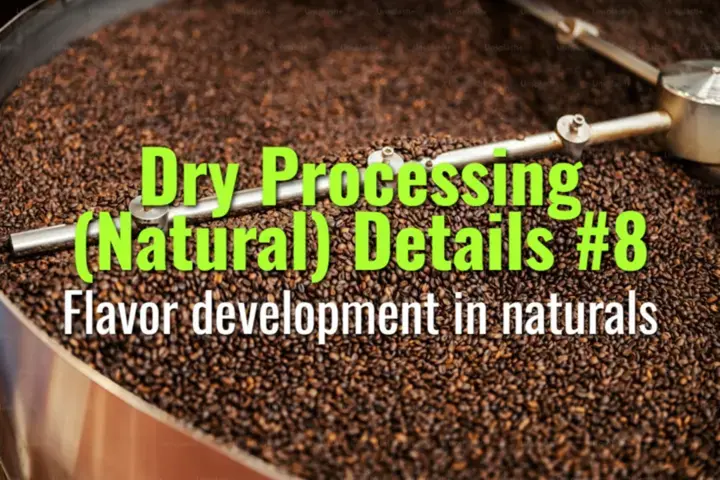Flavor development in naturals
This topic explains how flavor develops in natural (dry) processed coffees, the factors that influence it, and why naturals are known for their fruit-forward, complex profiles.
- Coffee Basics Nerds
- 2 min read
Article 8 of 12 in Dry Processing (Natural) Details/

Flavor Characteristics of Naturals
- Naturals often exhibit intense fruitiness (berries, tropical fruits, stone fruits).
- Sweetness is enhanced due to slow sugar concentration during drying.
- Body tends to be heavier, with winey or jam-like textures.
- Acidity is lower than in washed coffees, but flavors are broader and more exotic.
Factors Influencing Flavor Development
1. Cherry Ripeness
- Ripe cherries → sweet, fruity, clean flavors.
- Unripe or overripe cherries → astringent, moldy, or fermented defects.
2. Drying Conditions
- Slow, even drying: Enhances complexity and sweetness.
- Uneven drying: Creates inconsistency, earthy or dirty notes.
3. Microbial Activity
- Yeasts and bacteria ferment sugars in the pulp during drying.
- Controlled activity produces desirable fruity and floral aromatics.
- Uncontrolled activity → defects like sour, musty, or phenolic flavors.
4. Turning & Airflow
- Frequent turning and good ventilation prevent over-fermentation.
- Balanced airflow encourages uniform flavor development.
5. Storage Prior to Hulling
- Stable storage preserves fruity complexity.
- Poor storage degrades flavors into flat or musty profiles.
Common Flavor Notes in Naturals
- Fruity: Blueberry, strawberry, mango, pineapple.
- Sweet: Honey, chocolate, dried fruit.
- Winey/fermented: Red wine, rum, brandy-like tones.
- Floral (in some high-quality naturals): Jasmine, hibiscus.
Risks in Flavor Development
- Excess fermentation → overpowering alcohol or vinegar notes.
- Mold growth → earthy, musty cups.
- Inconsistent drying → mixed cup with both clean and defective notes.
Specialty Market Appeal
- Naturals are prized for their distinctive, fruit-forward profiles.
- Widely used in competitions and specialty cafés to showcase unique flavors.
- Polarizing for some consumers who prefer the clarity of washed coffees.
Lasting Importance
Flavor development in naturals represents the fusion of terroir, ripeness, and microbial activity. Managed carefully, it creates some of the world’s most unique and memorable coffees, driving demand in the specialty sector and expanding the flavor possibilities of coffee.
You might also like:
- Tags:
- Lasting Importance
- High Quality
- Uneven Drying
- Widely Used
- Flavor Development
- Microbial Activity
- Fruit Forward
- Flavor Notes
- Mold Growth
- Frequent Turning
- Factors Influencing
- Ripe Cherries
- Poor Storage
- Washed Coffees
- Specialty Market
- Fruity Floral
- Drying Conditions
- Stable Storage
- Yeasts Bacteria
- Overripe Cherries
- Unripe Overripe
- Tropical Fruits
- Musty Phenolic
- Defects Drying